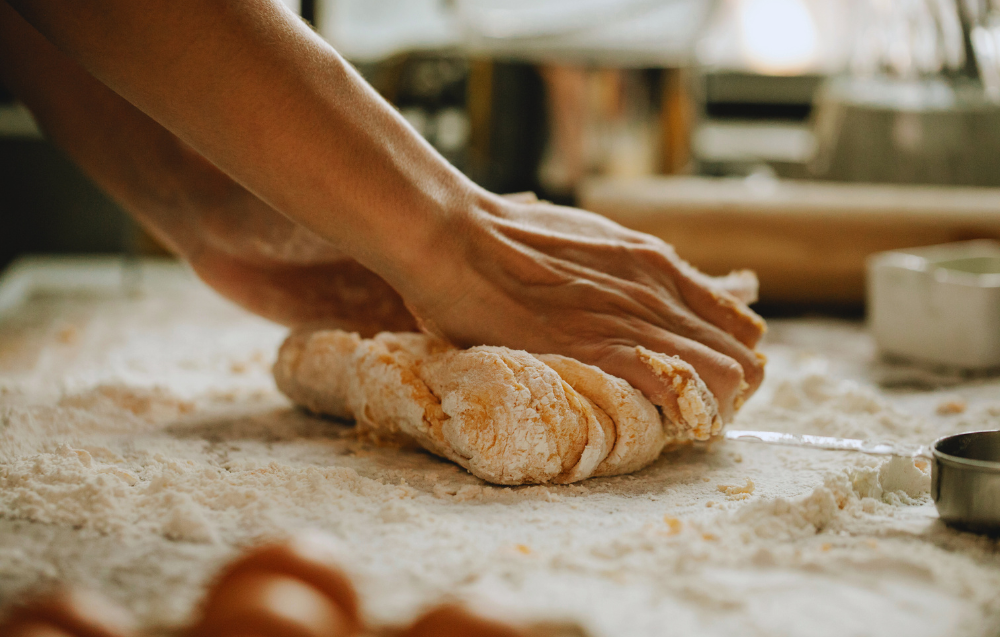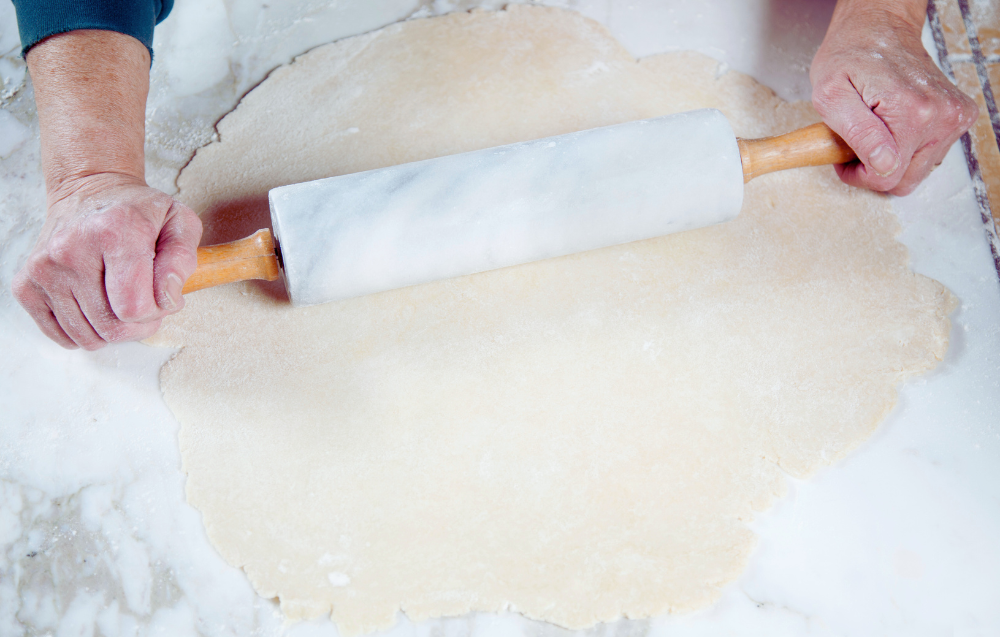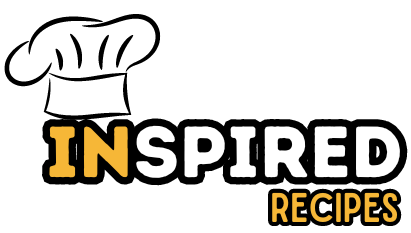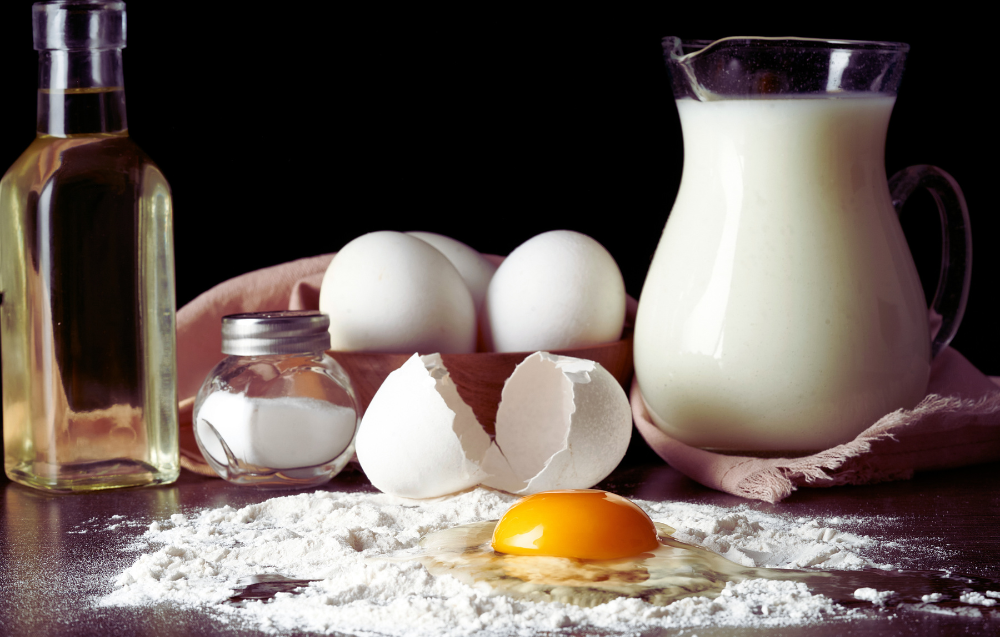Baking is an art that brings warmth, joy, and deliciousness to any occasion. Whether you’re a novice or an experienced baker, understanding the fundamentals of baking can elevate your skills and allow you to create delightful treats. This guide will take you through the key ingredients, tools, techniques, and solutions to common challenges, helping you perfect your baking game.
Introduction to Baking ESSENTIALS :
Baking is one of the oldest methods of cooking, dating back to ancient civilizations where bread was a daily staple. Over time, baking has evolved into a beloved craft, producing not just bread but cakes, cookies, pastries, and more. Today, it’s not just a necessity but also a creative outlet and a way to bring people together through shared treats.
Whether you’re baking for a special event or a casual weekend treat, having the right knowledge of essential ingredients and techniques can make all the difference.

Essential Ingredients in Baking
A good baker knows that the foundation of any recipe lies in the ingredients. Understanding what each one does will help you master the art of baking:
- Flour: The base of most baked goods.
- All-purpose flour: Suitable for most baking needs.
- Bread flour: Higher gluten content for a chewy texture.
- Cake flour: Lower protein content, ideal for light, fluffy cakes.
- Sugars: Sweetens and adds moisture.
- Granulated sugar: Common in most recipes.
- Brown sugar: Adds a deeper molasses flavour.
- Fats and Oils: Adds moisture, richness, and flavour.
- Butter: Traditional choice for rich flavour.
- Vegetable oil: Used for moisture in cakes and quick breads.
- Leavening Agents:
- Baking soda and baking powder: Essential for making baked goods rise.
- Yeast: Used in baking bread to ferment and raise dough.
Learning how to brown butter can elevate your flavours. Check out this guide to browning butter to master the technique and add depth to your baked goods.
Tools Every Baker Needs
Equipping yourself with the right tools is just as important as having the right ingredients. Here’s a list of must-have tools for any baker:
- Measuring Tools:
- Measuring cups and spoons: Ensure accurate measurements.
- Kitchen scale: Precision is key, especially when working with flour.
- Mixing Tools:
- Stand mixer or hand mixer: Helps with whipping, mixing, and kneading.
- Whisk and spatula: For light mixing or folding ingredients.
- Baking Pans and Sheets:
- Cake pans: Choose different sizes for layer cakes.
- Baking sheets: Essential for cookies and other flatbreads.
If you’re interested in trying your hand at artisan bread, this artisan bread recipe for beginners will help you get started with professional results at home.

Baking Techniques
Mastering basic baking techniques ensures that your results are consistent and delicious every time:
- Measuring Ingredients: Always use the correct measuring tools. For example, use a kitchen scale for flour to avoid using too much or too little.
- Mixing Methods:
- Creaming method: This involves beating butter and sugar together until fluffy, which is crucial for making cookies and cakes.
- Folding: A gentle technique used to incorporate delicate ingredients, like whipped egg whites, without losing air.
- Temperature and Timing: Always preheat your oven, and use an oven thermometer if you need clarification on its accuracy. Baking at the right temperature ensures your goods bake evenly and achieve the perfect texture.
Baking Challenges and How to Avoid Them
Even the most experienced bakers encounter challenges in the kitchen. Here are some common baking issues and tips on how to avoid them:
- Overmixing the Batter can result in tough cakes and cookies. To avoid this, mix until the ingredients are just combined.
- Incorrect Ingredient Measurements: More flour or more leavening can save a bake. Weigh your ingredients to ensure precision.
- Oven Temperature Issues: Baking at the wrong temperature can lead to burnt tops and raw centres. Use an oven thermometer to verify the correct temperature before baking.
Popular Baking Recipes to Try
With the right ingredients and tools, you can create a variety of baked goods that will impress any crowd. Here are some popular recipes to start with:
- Cookies:
- Classic chocolate chip cookies for a perfect balance of chewy and crispy.
- Oatmeal raisin cookies for a hearty, delicious bite.
- Cakes:
- Vanilla sponge cake that is soft and airy.
- Red velvet cake with a rich, creamy frosting.
- Breads:
- Artisan bread for those looking to master rustic loaves.
- Banana bread is a classic comfort bake.
- Pastries:
- Croissants and puff pastry for those ready to take on a challenge.
Remember to experiment with gluten-free baking using flour substitutes like almond flour or a gluten-free blend to accommodate dietary preferences.
Advanced Baking Techniques
For those ready to elevate their baking skills, here are some advanced techniques:
- Proofing and Fermentation: This technique is essential for making yeast-based bread, where the dough is left to rise before baking to develop flavour and structure.
- Laminating Dough: A more complex technique used in croissants and puff pastries where layers of butter are folded into the dough.
- Tempering Chocolate: For a glossy finish on chocolate treats, tempering is key. Learn how to temper chocolate with this step-by-step guide.
Healthier Baking Alternatives
Baking doesn’t always have to be indulgent. Here are some healthier alternatives to try:
- Low-Sugar Substitutes: Replace refined sugar with honey or maple syrup for a more natural sweetness.
- Low-Fat Baking: Substitute butter with Greek yoghurt or applesauce to reduce fat without sacrificing moisture.
- Gluten-Free and Vegan Baking: Use almond flour or coconut flour in gluten-free recipes. For vegan baking, replace eggs with flaxseed or chia seed mixtures.
FAQ (Frequently Asked Questions)
- How can I avoid dense cakes?
- Avoid overmixing the batter, and ensure you are using the correct amount of leavening agents.
- Why do cookies spread too much?
- This could be due to the butter being too soft. Try chilling your dough before baking to prevent excess spreading.
- Can I substitute baking soda for baking powder?
- No, these are not interchangeable. Baking soda requires an acidic ingredient to activate, while baking powder has its acid.
- What’s the best way to prevent a cake from sticking to the pan?
- Grease the pan thoroughly, or use parchment paper to line the bottom.
- How do I store baked goods to keep them fresh?
- Store them in an airtight container at room temperature or freeze them for longer-term storage.
Baking is both a science and an art, requiring precision, patience, and creativity. By mastering the essentials of baking, such as measuring ingredients accurately, understanding key techniques, and troubleshooting common issues, you’ll be well on your way to creating delicious treats. Whether you’re perfecting a classic cookie recipe or tackling an advanced croissant bake, the joy of baking lies in the process and the rewarding results.

